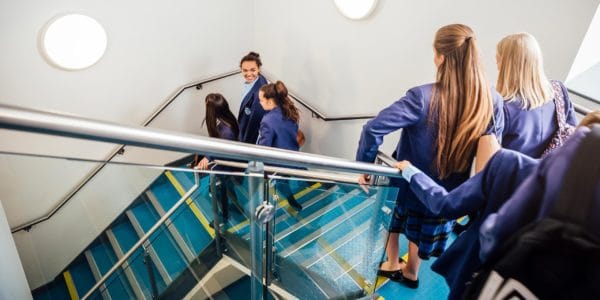Schools that have received a series of below good Ofsted grades often end up in a cycle of challenging circumstances and limited improvement, a new report warns.
A new study, funded by the Nuffield Foundation, has explored the underperformance of 580 schools in England that consistently received less than good Ofsted inspection grades between 2005 to 2018.
The report finds that ‘stuck schools’ often face more challenging circumstances including higher teacher turnover, higher levels of disadvantaged pupils and pupils with special educational needs. However, ‘stuck schools’ are not unique. Many other schools share most of these challenges but have managed to avoid a continuous cycle of less than good inspection judgements.Researchers, led by Dr Bernardita Munoz-Chereau (UCL Institute of Education) together with Jo Hutchinson (The Education Policy Institute) and Professor Melanie Ehren (Free University of Amsterdam), iidentified and analysed the data behind 580 ‘stuck’ schools compared with schools that were not ‘stuck’. This was combined with stakeholders’ experiences from both groups, taken via interviews and focus groups with 16 case study schools.
They found that after the initial negative Ofsted grade, the intake of a school tends to become more disadvantaged and teacher turnover increases, both of which contribute to the difficulty in reversing the negative Ofsted judgement. The longer the school continues to have the less than good rating, the harder the process of school improvement becomes.
However, the research also finds that a poor inspection judgement is only a modest contributing factor of ‘stuck’ schools’ lack of improvement or decline over time.
Joining a multi-academy trust showed small positive effects for secondary schools, in relation to lower teacher turnover and a lower chance of remaining ‘stuck’ in subsequent Ofsted inspections. There were no similar, positive effects for stuck primary schools that joined a multi-academy trust. These findings show, yet again, that academisation is not a silver bullet to deliver school improvement and the government should consider these results to help inform its future policies around academisation and school improvement.
The report offers a series of policy recommendations for DfE and Ofsted, encouraging increased holistic support for ‘stuck’ schools, including peer-to-peer guidance, and greater understanding of the impact the negative judgement can have.
Policy recommendations
For Department for Education:
- Consider whether there is adequate support, including financial support, for ‘stuck’ schools – particularly ‘stuck’ secondary schools whose per-pupil funding is only marginally higher than other secondary schools. Given that funding is attached to pupil enrolment and ‘stuck’ schools are under-subscribed, significantly increasing funding could help them become good.
- Help ‘stuck’ schools learn lessons from the experience of ‘un-stuck’ schools through creating networks and disseminating best practice guidance to successfully tackle similar challenging circumstances.
- Consider what more can be done to stabilise ‘stuck’ schools’ staff. Reducing excessively high teacher turnover, including loss of key staff and governance changes needs to happen before the school can improve.
- Review the positive and negative impact of academisation on ‘stuck’ schools to gain insights from the experiences in primary compared to secondary schools.
For Ofsted:
- Ensure that inspectors are properly trained to understand the significance and implications of schools working in very challenging circumstances, and the positive role they can play to support schools in their improvement journey.
- Consider what other positive support can be given to ‘stuck’ schools to assist in their improvement journey. This could include linking them with schools that have become ‘un-stuck’ or those that have specific expertise in areas that are core challenges, such as supporting children with EAL (English as an additional language) and/or refugee backgrounds.
- Consider what changes in inspection can be implemented to avoid the detrimental effect that a series of below-good Ofsted grades is having on school improvement, especially for schools working in challenging circumstances such as ‘stuck’ schools.
Commenting on the research, Dr Bernardita Munoz-Chereau, report author and Principal Research Fellow in Education, UCL Institute of Education, said: “How to solve the stubborn underperformance of around 580 ‘stuck’ schools in England is high on the government’s agenda. Our mixed-methods study is robust and expands Ofsted work by combining quantitative and qualitative methods to better understand patterns of change over time and stakeholders’ experiences in ‘stuck’ schools and their comparison group. Its results are timely as they show that inspections can have a detrimental effect, but also that ‘stuck’ schools can get ‘un-stuck’ given the right time and support.”
Jo Hutchinson, report co-author and Director for Social Mobility and Vulnerable Learners at the Education Policy Institute (EPI), said: “Stuck schools face many challenges such as increasing deprivation, professional isolation and very high teacher turnover. While their continuing struggle with poor inspection outcomes was not determined by these challenges, nor by the experience of receiving an adverse grading, there were nevertheless clear signs that these could make recovery more difficult. While academisation has helped many secondary schools to reduce the challenges they face, having a change of head teacher made things more challenging in the short term, and for primary schools, the same benefits of academisation were not evident in our analysis.”
Whilst valuing the role of Ofsted, ‘stuck’ schools also shared concerns, including inspectors not necessarily understanding the very challenging context of their school, oversurveillance and inconsistencies between inspections. Ofsted should ensure that their inspectors are trained to address these issues so that schools can be confident that they will be assessed fairly.”Ruth Maisey, Education programme head at the Nuffield Foundation



















































